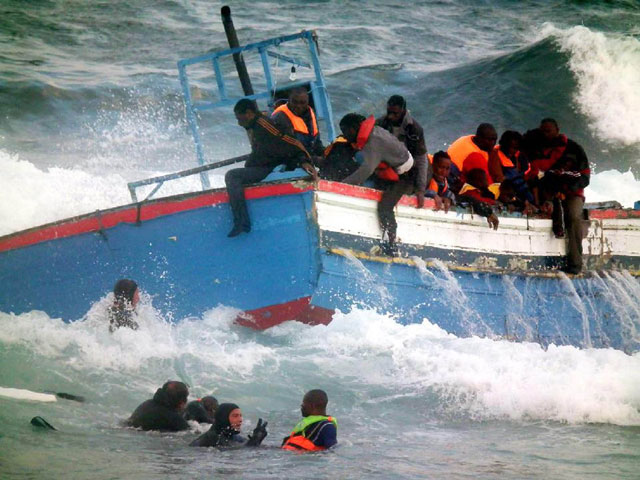DAMIETTA, Egypt — A twist of fate stopped Abu Fahd boarding a doomed migrant boat that sank off Malta with hundreds aboard, but the Syrian and his family are already plotting another perilous voyage.
Abu Fahd, his wife and five children were supposed to take a vessel from a beach on the outskirts of Egypt's Mediterranean city of Damietta but they missed it and were arrested by the military.
"We were crammed in a bus with more than 80 others. The smugglers had knives and pistols and they kept screaming at us," he said.
"We got out on a beach from where a waiting boat flashed laser beams as a signal. We tried to reach it but lagged behind as my wife was limping and then suddenly the army pounced on us."
The smugglers fled and the military handed Abu Fahd, his family and dozens of others to the police.
Four days later, the rickety boat was rammed and sunk by human traffickers after its passengers refused to change to an even smaller vessel.
About 500 people drowned in the disaster earlier this month in what has been called a "mass murder".
The worsening security situation in neighbouring Libya, another major departure point for migrants, has drawn growing numbers of people to Egypt in the hope of crossing the Mediterranean.
Sitting on his balcony at a hotel near Damietta, Abu Fahd said he would not let the brush with death deter him from trying to reach European soil.
"I will do it again and again," the bearded 51-year-old, dressed in a blue-striped shirt and shorts, told AFP.
Abu Fahd paid smugglers $3,000 (2,300 euros) to take him, his wife and children to Italy from Egypt, where they had been living illegally for years.
"I told my wife that the journey was dangerous and that I did not know whether we would reach the other shore with all our children alive," he said as his four-year-old son sat in his lap.
Abu Fahd, whose name has been changed for his security, and others like him say that despite the dangers they are determined to flee.
"My life has been a struggle and living illegally is hard too," Abu Fahd said, adding that his family's sole possessions are the clothes on their backs.
His passport expired years ago and he has been living in Cairo on borrowed money before coming to Damietta, about 295 kilometres north of the capital.
He paid the smugglers after selling his furniture.
Traffickers on Facebook
Gazia Abu Nabout's 18-year-old daughter Doaa was one of those aboard the ill-fated boat.
She was one of the few survivors and is now in Greece, but her fiance perished.
They had arranged the trip with smugglers through Facebook, said the 45-year-old mother.
The family, which relies on aid from the UN refugee agency, arrived in Egypt in 2012, fleeing the war in Syria.
They owe the smugglers $2,500 for the ill-fated voyage, which was the couple's second attempt to reach Europe.
"My daughter's fiance knew the dangers involved in the trip. But they wanted to go so they can help our families," said Doaa's father Shoukri Mohamed Zamel.
'Prowling gangs'
Activists say the Egyptian cities of Alexandria, Behaira, Kafr El Sheikh, Dakahaliya and Damietta have become centres for trafficking illegal migrants.
The authorities blame organised criminal gangs of people traffickers operating on Egyptian territory for shipwrecks such as the one off Malta.
"There is a mafia of smugglers that work on smuggling illegal immigrants to Italy," interior ministry spokesman Hany Abdel Latif told AFP when asked about accusations that Egyptian traffickers were behind last week's shipwreck.
He said migrants such as Syrians and Palestinians were entering Egypt under false pretences before trying to travel on to Europe.
In 2011 and 2012, traffickers smuggled people through Egypt's Sinai Peninsula to Israel and then to Europe, said International Organisation of Migration's Egypt co-ordinator Amr Taha.
"This route later changed and they smuggled people through Libya to Europe. And since 2013, Egypt has [once again] become the route after security situation deteriorated in Libya," he said.
But Abu Nabout said traffickers were not entirely to blame.
"The ship was not sunk by smugglers, but by criminal gangs who prowl in these waters. We can't blame the smugglers because they are helping us find better lives."
